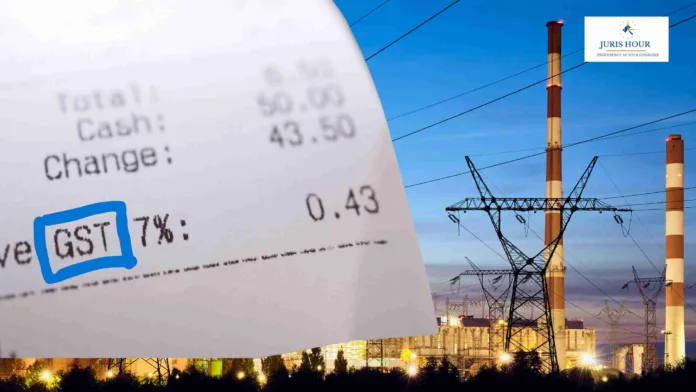Short answer: the applicability of Goods and Service Tax (GST) on the sale of electricity by private person depends on the capacity and method of supply.
In the realm of indirect taxation, electricity holds a unique and often misunderstood position under GST. A recent expert WhatsApp conversation in the group GST.Chitkara.Jurishour, comprising leading tax professionals and legal minds, dissected the tax implications surrounding the sale and distribution of electricity—particularly by private individuals. The discussion revealed how practical business models, regulatory frameworks, and statutory interpretations intersect to determine GST applicability.
Participants in this robust exchange included Mr. Sudip Gupta, Mr. Ajit, Mr. Raghu, Ms. Nidhi Jain, Mr. Mukul Sharma, Mr. K.L. Sethi, and Mr. Hardeep Singh.
This article condenses that exchange into a coherent explanation with examples and clarifications to resolve the confusion around this complex issue.
Is Sale of Electricity by a Private Person Taxable under GST?
Electricity is classified as goods under GST law and is exempted from tax when sold as electrical energy, per Entry 104 of Notification No. 2/2017-Central Tax (Rate). However, the exemption does not extend uniformly across all suppliers or modes of supply.
Supply of Electricity: Generation, Transmission, Distribution
To fully grasp GST implications, we must understand the supply chain in electricity:
- Generation: Production of electricity (e.g., via solar, wind, DG sets).
- Transmission: High-voltage transfer from power plants to substations.
- Distribution: Final delivery to end consumers.
Under the Electricity Act, 2003, supplying power usually requires a license. Only licensed electricity transmission or distribution utilities are eligible for exemption under Entry 25 of Notification No. 12/2017-CT (R).
Key GST Notifications in Play
| Notification | Applicability | Tax Treatment |
| 2/2017-CT(R) | Sale of electrical energy (goods) | Exempt |
| 12/2017-CT(R) | Transmission and distribution services by licensed utilities | Exempt |
| Other services (e.g., ancillary charges, if not by utility) | Taxable @18% under SAC 9969 |
When is Supply of Electricity Taxable?
If Supplied by Private Individual without License:
When a builder, RWA, mall, or captive solar operator supplies power to tenants or multiple consumers without holding a transmission/distribution license, it is taxable at 18%.
Even if the electricity is billed based on actual consumption (e.g., sub-metering), it’s treated as a supply of service.
Composite Supplies with Power:
Where electricity supply is bundled with rental or leasing services (e.g., co-working spaces), it forms a composite supply. If the principal supply is taxable (like renting), then entire consideration becomes taxable, including sub-meter charges.
Reimbursement vs. Sale:
If electricity charges are reimbursed without markup, and the supplier acts as a pure agent (as defined under Rule 33 of CGST Rules), then GST is not applicable.
However, markup or failure to meet pure agent conditions leads to taxability.
Common Practical Scenarios Explained
Rooftop Solar by Private Generator
- Generator uses power for own consumption (captive use): Exempt
- Generator supplies to other units within the premises without license: Taxable
- Generator sells power to DISCOM at generation point: Exempt
Commercial Complex with Sub-Metering
Owner installs one DISCOM meter and redistributes to tenants via sub-meters.
- No markup, acts as pure agent: Exempt
- Adds markup or combines with rent: Taxable (composite supply)
Power Supplied through Licensed Utility
Even if supplied by private producer but routed through a licensed DISCOM or utility: Exempt, subject to conditions of Notification 12/2017.
Advance Rulings and Circulars
- Circular No. 234/6/2024-GST (para 9.1): Regularized GST liability on ancillary services rendered by licensed utilities for period 01-07-2017 to 09-10-2024.
- Recent AARs: Hold that where electricity is bundled with tenancy or other services, it may be taxable as composite supply.
The Final Word: Identity of Supplier Matters
It is a misconception that electricity, once classified as goods, is always exempt regardless of who supplies it. The identity and legal standing of the supplier, the manner of supply, and bundling with other services all determine GST liability.
In summary:
- Pure sale of electricity = exempt
- Transmission/distribution by licensed utility = exempt
- Sale/distribution by unlicensed private parties = taxable
- Electricity bundled with taxable service (e.g., rent) = taxable
- Reimbursement without markup as pure agent = exempt
Conclusion
The supply of electricity is deceptively complex under GST. While the exemption under Notification 2/2017 seems straightforward, practical implementation — especially in commercial leases, solar parks, and group housing — demands granular analysis of the nature of supply, supplier’s identity, and regulatory approvals. A nuanced understanding of both GST law and the Electricity Act is essential before concluding taxability.
As India’s energy landscape evolves, tax professionals must keep pace with both regulatory changes and business practices to ensure compliant and optimal tax treatment.
Read More: How to Invest in US Stocks from India?

